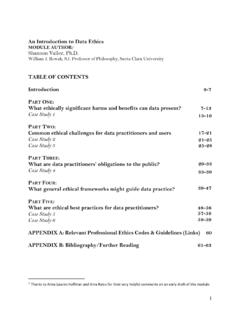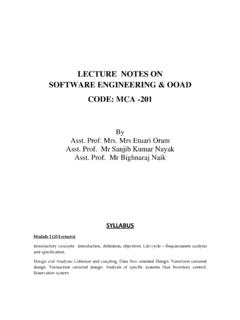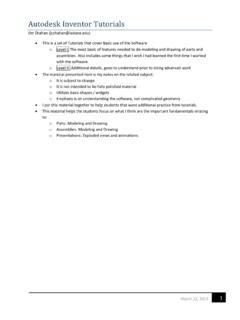Transcription of An Introduction to Software Engineering Ethics
1 FREE FOR COURSE USE WITH WRITTEN PERMISSION; EMAIL THE MARKKULA CENTER FOR. APPLIED Ethics AT NOT FOR PUBLICATION OR OTHER UNAUTHORIZED. DISTRIBUTION. An Introduction to Software Engineering Ethics MODULE AUTHORS: Shannon Vallor, Associate Professor of Philosophy, Santa Clara University SPECIAL CONTRIBUTOR TO Introduction : Arvind Narayanan, Assistant Professor of Computer Science, Princeton University These documents contain fields that can be filled in by users who have downloaded the free Adobe Reader. Simply download the appropriate document to your computer, type your comments in the boxes, and save the completed version.
2 To send the version with your responses, include it as an attachment to an email. What do we mean when we talk about Ethics '? Ethics in the broadest sense refers to the concern that humans have always had for figuring out how best to live. The philosopher Socrates is quoted as saying in 399 , the most important thing is not life, but the good life. 1 We would all like to avoid a life that is shameful and sad, wholly lacking in achievement, love, kindness, beauty, pleasure or grace. Yet what is the best way to achieve the opposite of this a life that is not only acceptable, but even excellent and worthy of admiration?
3 This is the question that the study of Ethics attempts to answer. Today, the study of Ethics can be found in many different places. As an academic field of `study, it belongs primarily to the discipline of philosophy, where scholars teach and publish research about the nature and structure of ethical norms. In community life, Ethics is pursued through diverse cultural, political and religious ideals and practices. On a personal level, it can be expressed in an individual's self-reflection and continual strivings to become a better person. In work life, it is often formulated in formal codes or standards to which all members of a profession are held, such as those of medical Ethics .
4 Professional Ethics is also taught in dedicated courses, such as business Ethics . It can also be infused into courses such as this one. What is Ethics doing in a course for Software engineers? Like medical, legal and business Ethics , Engineering Ethics is a well-developed area of professional Ethics in the modern West. The first codes of Engineering Ethics were formally adopted by American Engineering societies in 1912-1914. In 1946 the National Society of Professional Engineers (NSPE) adopted their first formal Canons of Ethics . In 2000 ABET, the organization that accredits university programs and degrees in Engineering , began to formally require the study of Engineering Ethics in all accredited programs: " Engineering programs must demonstrate that their graduates have an understanding of professional and ethical responsibility.
5 2 Professional engineers today, then, are expected to both learn about and live up to ethical standards as a condition of their membership in the profession. 1 Plato, Crito 48b. In Cahn (2010). 2 ABET 2000 criterion 3(f) (ABET, 1998). But the average computer/ Software Engineering student might still be confused about how and why this requirement should apply to them. Software Engineering is a relatively young practice and compared with other Engineering disciplines, its culture of professionalism is still developing. This is reinforced by the fact that most Engineering Ethics textbooks focus primarily on ethical issues faced by civil, mechanical or elecrical engineers.
6 The classic case studies of Engineering Ethics depict catastrophic losses of life or injury as a result of ethical lapses in these fields: the Challenger explosion, the Ford Pinto fires, the Union Carbide/Bhopal disaster, the collapse of the Hyatt walkway in Kansas City. When we think about the engineer's most basic ethical duty to hold paramount the safety, health, and welfare of the public, 3 it is clear why these cases are chosen - they powerfully illustrate the importance of an engineer's ethical obligations, and the potentially devastating consequences of failing to live up to them. But Software engineers build lines of code, not cars, rockets or bridges full of vulnerable human beings.
7 Where is the comparison here? Well, one answer might already have occurred to you. How many cars or rockets are made today that do not depend upon critical Software for their safe operation? How many bridges are built today without the use of sophisticated computer programs to calculate expected load, geophysical strain, material strength and design resilience? A failure of these critical Software systems can result in death or grievous injury just as easily as a missing bolt or a poorly designed gas tank. This by itself is more than enough reason for Software engineers to take seriously the Ethics of their professional lives.
8 Is it the only reason? What might be some others? Consider the following: The Software development and deployment process in the Internet era has some peculiarities that make the ethical issues for Software engineers even more acute in some ways than for other types of engineers. First, the shortened lifecycle has weakened and in some cases obliterated Software review by management and legal teams. In the extreme, for Web applications like Facebook, it is normal for individual engineers or small groups of engineers to code and deploy features directly, and indeed the culture takes pride in this.
9 Even where more traditional development practices prevail, at least some deployments like bug fixes are shipped with only technical (and not ethical) oversight. At any rate, engineers at least retain the ability to deploy code directly to end users, an ability that can easily be abused. All of this is in stark contrast to say, a civil Engineering project with a years-long (or decades-long) lifecycle and multiple layers of oversight. Nor does such a project offer a malicious engineer any real means to obfuscate her output to sneak past standards and safety checks. Second is the issue of scale, perhaps the defining feature of the Software revolution.
10 Typically the entire world is part of the addressable market. Of course, it is scale that has led to the potential for individual engineers to create great good, but with it naturally comes the ability to cause great harm, especially when combined with the first factor above. 3 NSPE Code of Ethics for Engineers, First Fundamental Canon. 2. Here's a rather benign but illustrative example. On June 9, 2011, Google released a doodle honoring Les Paul which users found addictive to play with. This is a type of project that's typically done by an individual engineer on their 20% time in a day or two.















